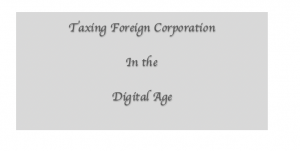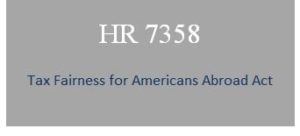Effectively Connected Income and it’s Tax Consequences
 Foreign entities that deliver digital goods and services using the internet as a point of distribution may be subject to U.S. income tax. The nature and character of the goods and services will dictate how the income is taxed. In the interest of clarity, the following discussion is limited to effectively connected income.
Foreign entities that deliver digital goods and services using the internet as a point of distribution may be subject to U.S. income tax. The nature and character of the goods and services will dictate how the income is taxed. In the interest of clarity, the following discussion is limited to effectively connected income.
The explosion of foreign companies using the internet to deliver digital products and services has afforded foreign businesses the opportunity to compete in global markets without the necessity of a traditional bricks and mortar operation. In this regard, the critical question is always this: Does the United States have a right to impose an income tax? It is important to note that jurisdiction to tax a foreign entity requires determining whether a sufficient connection or nexus with the United States exists to justify imposing an income tax. Foreign corporations are subject to U.S. income tax on income that is considered effectively connected income (“ECI”) and associated with conducting a trade or business within the United States 26 U.S.C. § 864(b), 26 U.S.C. § 871(b) and26 U.S.C. § 882(a).
Business Presence in United States Tax Consideration
ECI is based upon the permanent establishment of a presence in the United States. In some cases, the question of permanent establishment is easy. For instance, a foreign company that leases office space and employs its administrative staff in Phoenix will be deemed to have permanently established a U.S. presence. Other cases are less clear, for example, a case where goods and services are digitally delivered to consumers in the United States, while the company’s operation, employees, website and servers are located in one or more countries. Generally, the existence of a website alone is insufficient to establish a permanent establishment within the United States due to the absence of any tangible physical component. In contrast, the location of the server, where the website is hosted is a piece of equipment with a physical location. Thus, the presence of a server in the United States may be sufficient for purposes of permanently establishing a U.S. presence. This is particularly true where a foreign company owns and operates its servers or has physical access to them. For U.S. tax purposes, the delivery of goods and services through a server that is located in the United States but neither owned, leased nor at the disposal of a nonresident does not currently create a permanent establishment in the United States.
Foreign companies will often deliver their products and services via the Cloud using the Software as a Service(“SaaS”) model or by using a CD, portable USB device or by the customer downloading a copy of the software from the company’s website. The SaaS model involves using a third party to host a foreign company’s website and software and to store and process its hardware infrastructure. These solutions are generally delivered to consumers over the internet for a fee. The manner in which these products and services are delivered will affect how the income is characterized for U.S. tax purposes.
Character of Income in US Business Tax Consideration
The amount of a foreign company’s ECI depends, in part, on the source and character of the income.The starting point for evaluating these inbound transactions can be found in the Treasury Software Regulations(the “Regs.”). Under the Regs, the character of payments received in transactions involving computer programs is based on the nature of the rights conveyed. The determination is made without regard to the transaction form adopted by the parties or the terms they apply (26 C.F.R. § 1.861-18(g) (1)). Moreover, the means of the transaction (that is, whether by purchase of physical disc or electronic download) is irrelevant (26 C.F.R. § 1.861-18(g) (2)).
Under the Regs, computer software transactions are classified into four categories:
- The sale of a copyright right: the right to make copies of the property, the right to prepare derivative property, the right to make public performances, or the right to publicly display the property (26 C.F.R. 1.861-18(c) (1) (i) and 26 C.F.R. § 1.861-18(c) (2) (i)-(iv)).
- The license of a copyright right: considered a sale or exchange for income tax purposes if under the facts and circumstances, the transferee receives substantially all of the right to the underlying copyright. Where less than substantially all of the rights to the underlying copyright are transferred, the transfer will be treated as a license (26 C.F.R. §1.861-18(f) (1)).
- The sale of a copyrighted article: transferee receives a copy of a software program but acquires no rights (or a deminimis grant of rights) that accompany a copyright right (26 C.F.R. § 1.861-18(c) (1) (ii)). To qualify for sale treatment, the transferee of the copyrighted article must receive all the “benefits and burdens” of ownership
- The lease of a copyrighted article: Where all of the benefits and burdens of ownership have not been transferred, the transaction will be treated as a lease generating rental income (26 C.F.R. § 1.861-18(f) (2)).
The Regs, however, do not applyto transactions involving digitized content or services that do not involve the transfer of a computer program. Transactions involving hosted software, such as SaaS, do not include a transfer of a computer program, and, as such, are not subject to the Regs (26 C.F.R. §1.861-18(b) (1)). The question then is: whether hosted software transaction is a property or services transaction? That distinction can be found in 26 U.S.C. §7701(e),which provides that a contract that “purports to be a service contract” can be recast as a lease based upon the existence of the following factors:
- The customer is not in physical possession of the software.
- The customer does not control the software application.
- The customer does not have a significant economic or possessory interest in the software.
- The provider uses the software to provide services to multiple third parties.
The Section 7701 (e) factors should be carefully examined when considering SaaS services or similar digital transactions. Payments made in exchange for SaaS services are generally characterized as service income because such transactions do not satisfy a number of the Section 7701(e)factors.
In Tidewater Inc. v. U.S.,(565 F.3d 299 (5th Cir. 2009), the U.S. Court of Appeals for the 5th Circuit applied the 26 U.S.C. § 7701(e) factors in holding that income earned by a time charter that supplied a vessel complete with a crew to its customers constituted leasing income.In Xerox Corp. v. U.S., (656 F.2d 659 (Ct. Cl. 1981), the U.S. Court of Claims applying a set of factors predating Section 7701(e) determined that a supply of copying machines was treated as a service.
Source of income in US Business Tax Determination
In addition to the “character” of the income”, the “source” of the income will also drive certain U.S. federal income tax consequences (e.g., application of withholding tax to foreign persons, application of the foreign tax credit limitation formula).
Income earned from the performance of “services” is sourced according to the place of performance. If the services are performed in the United States, the income is U.S. sourced income, and subject to U.S. federal income tax; if the services are performed outside the United States, the income is considered foreign-sourced income and exempt from U.S. tax.
Determining where a digital service is performed, and, thus, the source of the income derived in connection with such service, can be difficult in certain cases. For instance, in Piedras Negras Broad Co. v. Comm’r,the United States Board of Tax Appeals held that the source of a Mexican broadcaster’s income was Mexico since the broadcast originated in Mexico and the facilities and personnel were located in Mexico, not the United States, where its customers were located ((43 BTA 297 (1941) (nonacq. 1941-1 CB 18), aff’d, 127 F.2d 260 (5th Cir. 1942)). Similarly, in Korfund v. Comm’r,(1 T.C. 1180 (1943), the Tax Court interpretingPiedras Negrasheld that the source of such income was not within the United States, by holding that the source of income is the situs of the income-producing service and that the source of the income was the act of transmission.
In conclusion, tax jurisdiction as well as the character and source of incomeplay a critical role in determining the U.S. federal income tax consequences as well as how the income will be taxed. Accordingly, foreign companies planning to do business within the U.S. would be well advised to consult with an experienced and knowledgeable tax attorney prior to conducting business.

 Citizen Based Taxation
Citizen Based Taxation
